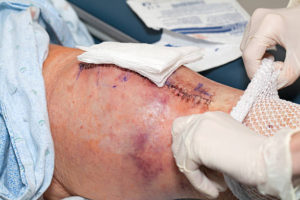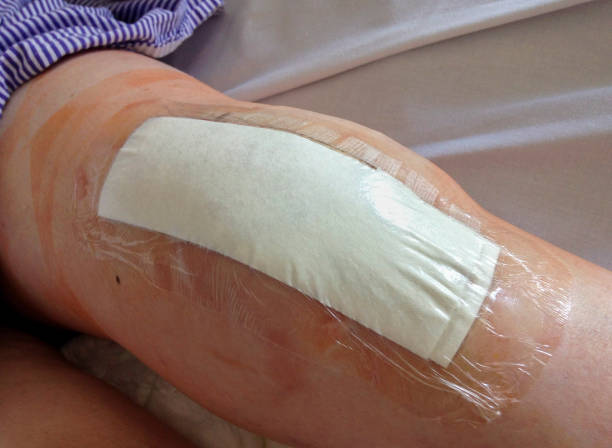Swelling is a common side-effect of surgery. In this blog post, we will discuss some ways how to reduce swelling after surgery.
Basic Aftercare Protocols After Surgery To Reduce Swelling
- Ice: Applying ice to the affected area can help reduce swelling. It is important to do this for 20-30minutes, and to wrap the ice in a towel so that it does not come into direct contact with your skin.
- Compression: Wearing compression garments can also help reduce swelling. These garments apply pressure to the affected area, which can help reduce fluid build-up. For example, wearing stockings after surgery can help reduce swelling in your legs.
- Exercise: Although it may be difficult to exercise immediately after surgery, starting gentle exercises once your doctor gives you the okay can help improve circulation and reduce swelling. Walking is a great way to start, and you can gradually increase the intensity of your workouts as you feel comfortable.
- Diet: Eating a healthy diet with plenty of fruits and vegetables can help reduce inflammation and swelling. Foods that are high in anti-inflammatory properties include omega-3 fatty acids, turmeric, ginger, and green tea.
- Massage: Gently massaging the affected area can also help to reduce swelling. This helps to improve circulation and lymphatic drainage. Massaging should be done gently, as too much pressure can increase swelling.
- Elevation: Keeping the affected area elevated above heart level can also help reduce swelling. This helps gravity to drain the fluid away from the area. You can do this by propping up the affected area on pillows or by lying down with your head and shoulders elevated.

Preventing Swelling After Surgery
There are also a few things that you can do to prevent swelling after surgery.
- First, make sure to follow all of your doctor’s instructions for care after the surgery. This includes things like ice, compression, and elevation.
- Second, avoid salt and alcohol as these can contribute to fluid retention and increased swelling.
- Third, protect your skin with sunscreen and insect repellent as sun exposure and bug bites can lead to swelling.
- Fourth, try to take it easy and avoid any strenuous activity or exercise for at least a week after surgery.
- Fifth, stay hydrated by drinking plenty of water and other fluids.
- Sixth, use sunscreen and insect repellent to protect your skin, make sure to talk to your doctor about any medications you are taking as some can contribute to swelling.
- Finally, try to stay active as this can help improve circulation and reduce swelling.
Medicine That Helps Reduce Swelling
There are a few over-the-counter options that can help reduce swelling. These include:
1. Ibuprofen: This is an anti-inflammatory medication that can help reduce swelling.
2. Arnica: This is a homeopathic remedy that has been traditionally used to treat bruises and swelling.
3. Vitamin C: This vitamin is known for its antioxidant properties and can help reduce inflammation.
4. Bromelain: This is a natural enzyme found in pineapples that can help reduce swelling and inflammation.
5. Topical retinoids: These are prescription medications that are commonly used to treat acne, but they can also help reduce inflammation and swelling.
6. Steroids: These are powerful anti-inflammatory medications that can be taken orally or injected into the affected area. They are typically only used for severe cases of swelling.
Swollen Ankles After Surgery
It’s not uncommon to have swollen ankles after surgery. The swelling is usually the result of fluid retention and inflammation. While it can be uncomfortable, there are things you can do to reduce the swelling.
1. Rest with your feet elevated.
When you’re resting, prop your feet up on a pillow or two. This will help reduce the swelling by allowing gravity to pull the fluid away from your feet and ankles.
2. Wear compression socks or stockings.
Compression socks or stockings apply gentle pressure to your feet and ankles, which can help reduce the amount of fluid that collects in these areas. You can buy these garments at most pharmacies or online.
3. Exercise your ankles and feet.
Gently moving your ankles and feet can help pump the excess fluid out of them. Try doing some simple ankle circles or point-and-flex exercises a few times a day.
4. Massage your feet and ankles.
Giving yourself a foot or ankle massage can also help reduce swelling. Use your hands to gently knead the muscles in your feet and ankles.
5. Ice your feet and ankles.
Applying ice to your feet and ankles can help reduce inflammation and pain. Wrap a bag of ice in a towel and apply it to the affected area for 10-15 minutes at a time, several times a day.
If you’re still experiencing swelling after trying these home remedies, talk to your doctor. They may prescribe medication or recommend other treatments.

Swollen Eye After Surgery
Swelling around the eye is common after surgery. The swelling is usually the result of fluid retention and inflammation. While it can be uncomfortable, there are things you can do to reduce the swelling.
1. Rest with your head elevated.
When you’re resting, prop your head up on a pillow or two. This will help reduce the swelling by allowing gravity to pull the fluid away from your eyes.
2. Apply a cold compress.
Applying a cold compress to your eyes can help reduce inflammation and pain. Wrap a bag of ice in a towel and apply it to the affected area for 10-15 minutes at a time, several times a day.
3. Gently massage the area around your eyes.
Massaging the muscles around your eyes can help reduce inflammation and pain. Use your fingertips to gently knead the muscles in your temples, forehead, and cheekbones.
4. Apply a warm compress.
If you find that a cold compress isn’t providing relief, try a warm compress instead. Soak a clean washcloth in warm water and apply it to the affected area for 10-15 minutes at a time, several times a day.
5. Try over-the-counter medications.
There are a few over-the-counter medications that can help reduce swelling and pain. These include ibuprofen, acetaminophen, and antihistamines.
Conclusion
In conclusion, swelling is a common side effect of surgery, but there are things that you can do to reduce it. Be sure to follow your doctor’s instructions, and try some of the home remedies listed above. If you are still having trouble with swelling, talk to your doctor about other options such as medication.
